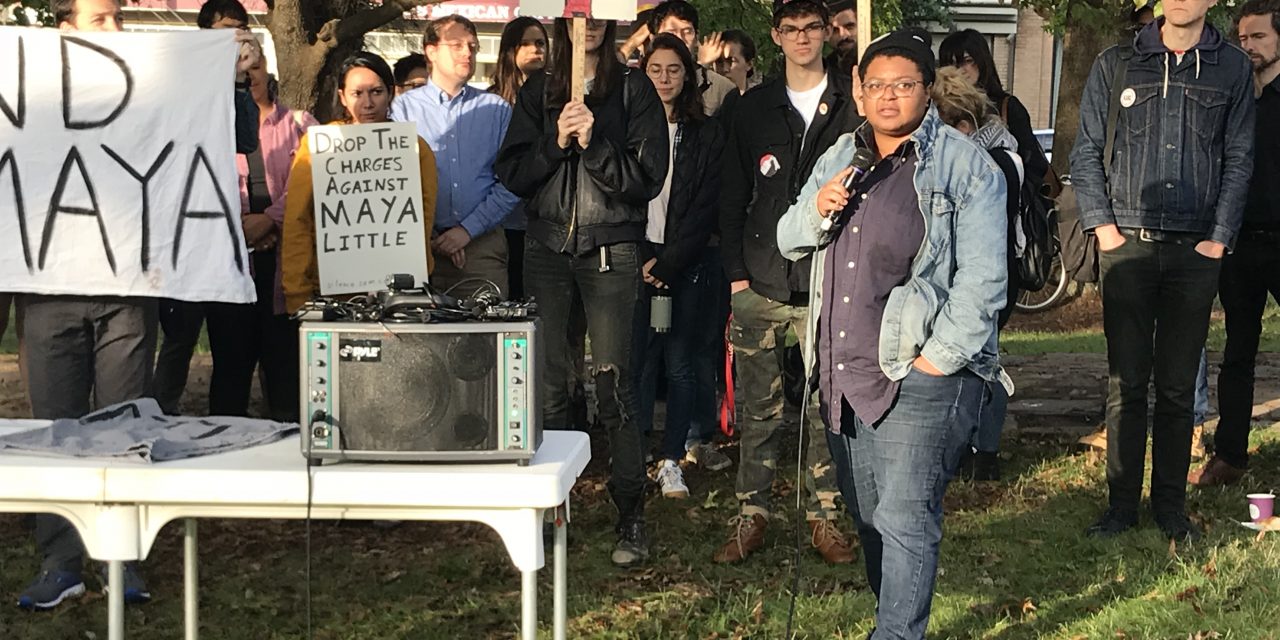UNC graduate student Maya Little will receive a hearing in her appeal of an Honor Court decision finding her responsible for damaging Silent Sam earlier this year.
On Monday, UNC Judicial Programs Officer Aisha Pridgen accepted Little’s request for an appeal. The case now goes to UNC’s University Hearings Board.
Click here to read Pridgen’s statement.
Little was arrested on April 30 after an anti-Silent Sam demonstration in which she poured a mixture of red paint and her own blood on the statue. In October, she was found guilty of “defacing a public monument” in Orange County court, but Judge Samantha Cabe declined to impose a sentence.
But Little also faced a separate charge of “damaging university property” in UNC’s Honor Court. Last month, in a 3-2 decision, a five-judge panel found Little responsible and sentenced her to 18 hours of community service.
Little is appealing that ruling on three grounds: “insufficiency of evidence,” “denial of basic rights,” and the “severity of sanctions.”
Click here to read Little’s appeal.
The “insufficiency of evidence” appeal asserts that the Honor Court didn’t have enough evidence to conclude that pouring paint on the statue constituted “damage.” (It was on that question that the original Honor Court judges were divided: it cost the university more than $4,000 to clean the statue, but two of the five judges concluded that the word “damage” implied a more permanent defacement.)
Click here to read the Honor Court ruling.
The “denial of basic rights” appeal is based on the Honor Court’s decision not to require one of the judges to recuse himself from the case. Little had objected to Frank Pray, who had made public comments supporting Silent Sam; Little and her supporters walked out of the hearing after the judges ruled that Pray could remain on the panel.
The “severity of sanctions” appeal asserts that the Honor Court imposed a sentence on Little that was far more severe than other sentences it had imposed in similar previous cases. (In particular, Little’s appeal cites the case of UNC football players who spray-painted Duke’s visiting locker room in 2015; that action cost UNC more than $27,000, but the Honor Court ultimately imposed no sanction at all.)
It is now up to the University Hearings Board to determine how the case will proceed. According to the pro-Little organization Take Action Chapel Hill, the board could “dismiss the case, remand the case for rehearing, or do nothing.”
In her statement granting Little’s appeal request, Pridgen says her decision is solely procedural: “Nothing in this letter should be construed as an expression of opinion regarding the merits of your appeal or whether it should result in relief of any sort.” The University Hearings Board is responsible for making those determinations.
Pridgen says the appeal hearing will be scheduled at a later date, “as promptly as possible with all necessary parties’ availability in mind.”
Related Stories
‹
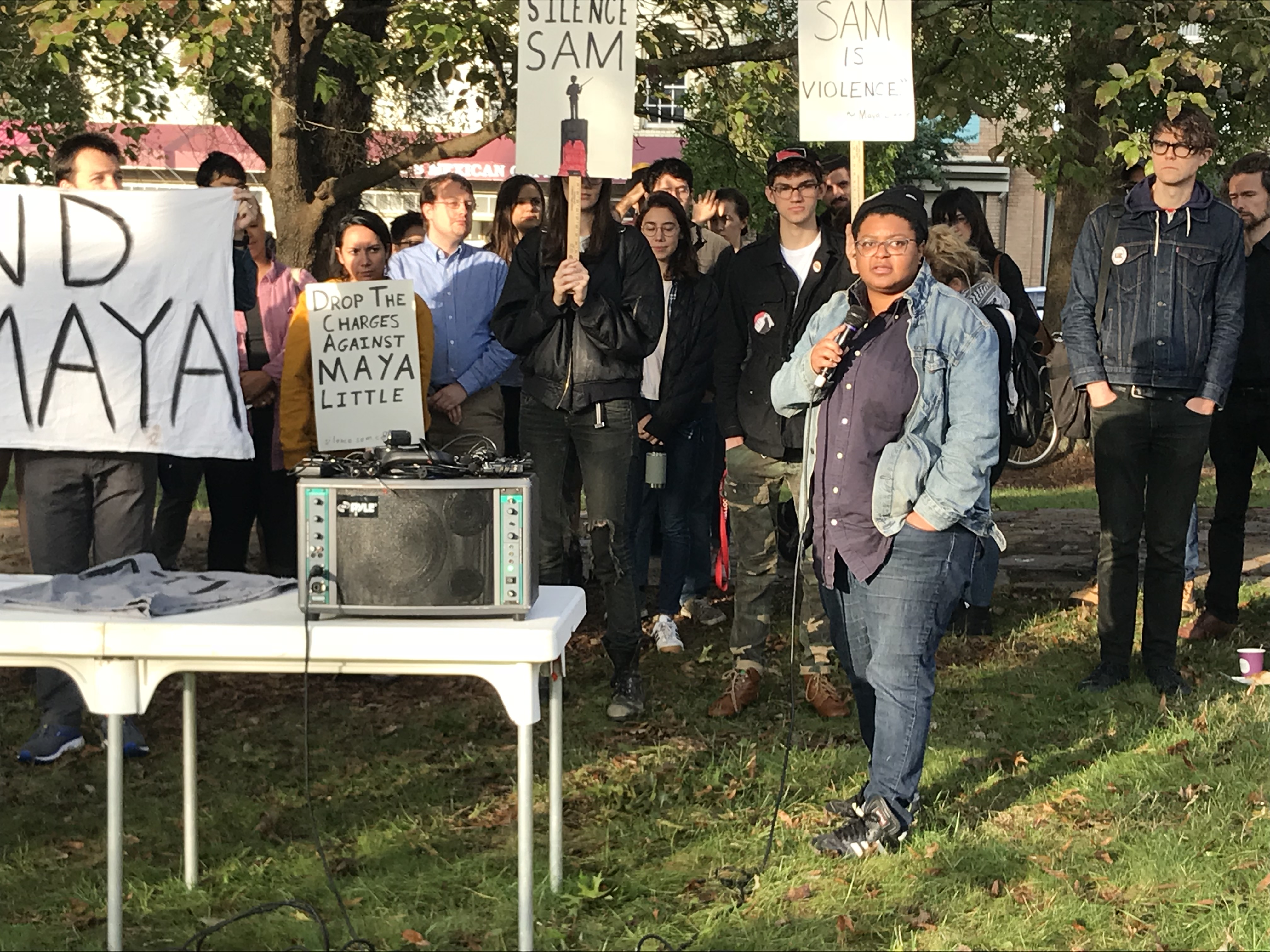
Maya Little Appealing UNC Honor Court ConvictionMaya Little was sentenced to 18 hours of community service for pouring red paint mixed with her own blood on Silent Sam earlier this year.

UNC Honor Court Sanctions Silent Sam ProtesterThe UNC Graduate and Professional School Honor Court has found Maya Little responsible for violating the university’s code of conduct. The history grad student poured a mixture of what she said was her own blood and red paint on the Confederate monument on the Chapel Hill campus known as Silent Sam in April. The Daily […]

With 'Universities Studying Slavery' Conference, UNC Tackles Its Own Troubled HistoryUNC's "Universities Studying Slavery" conference will focus on how colleges can wrestle with their own troubling racial history.
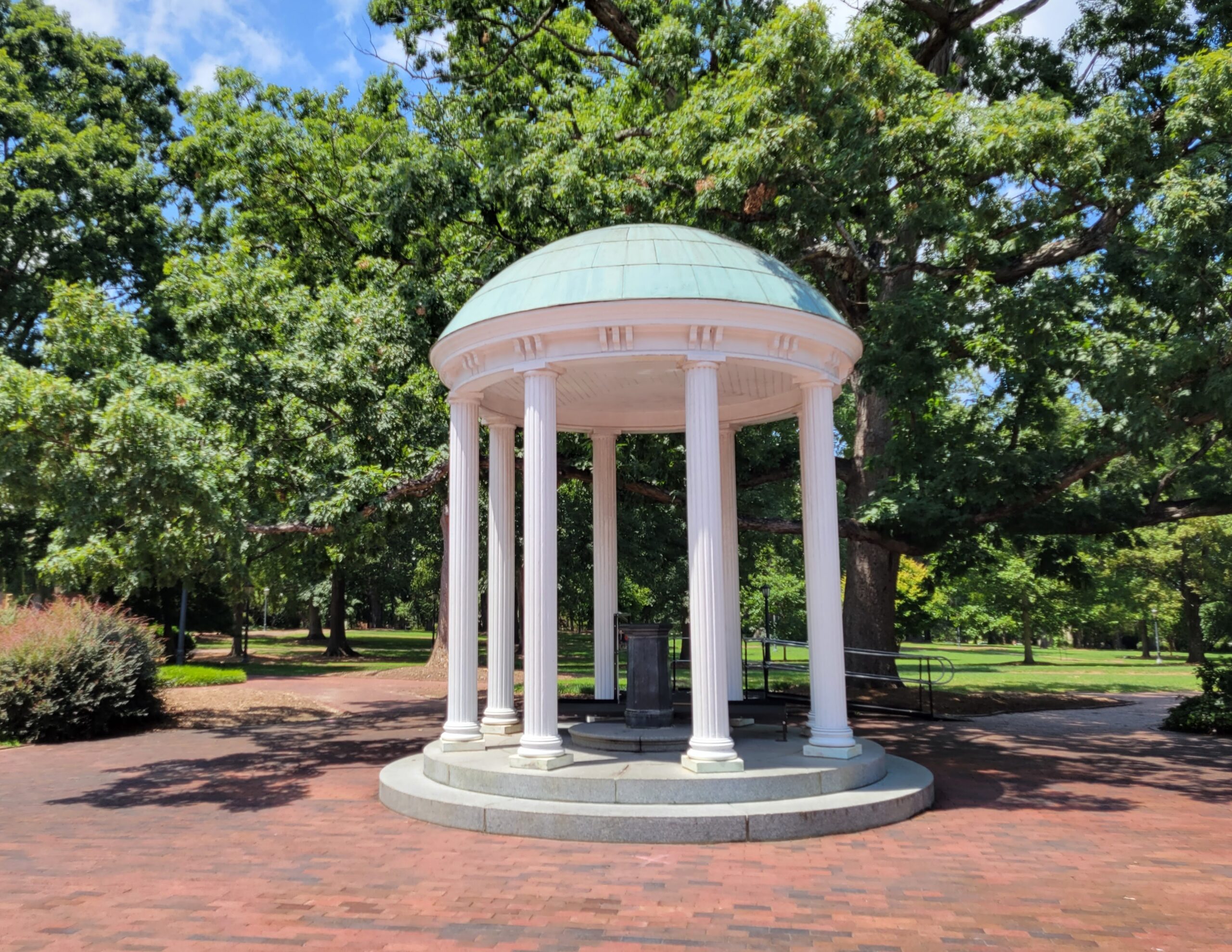
Social Media Tracking Tool, Used By UNC, Raises Speech and Privacy ConcernsConcerns about free speech and privacy rights have been raised around a social media program that UNC has used to monitor protests.
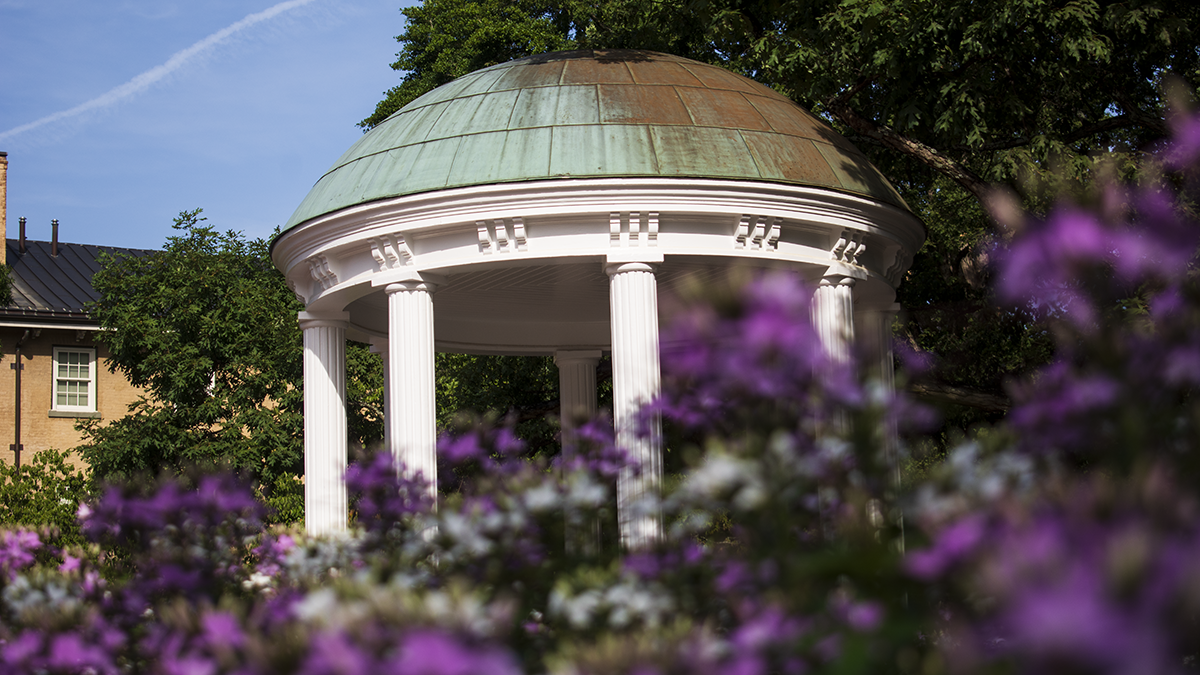
Collection of UNC Faculty Call for Chancellor Guskiewicz's Resignation Over Silent Sam SettlementUPDATE: This story has been updated with statements from UNC, which were issued to the campus community and sent to Chapelboro. A group of UNC faculty is calling for UNC Chancellor Kevin Guskiewicz’s resignation as more details emerge regarding the university’s involvement in the 2019 settlement over a Confederate monument previously on the Chapel Hill […]
![]()
Report: Charges Dismissed for 2 Accused of Helping Take Down Silent SamTwo of the remaining people facing charges in the toppling of the Confederate statue known as Silent Sam saw their charges dismissed by the court system this week. According to a report from The News & Observer on Wednesday, the charges for Raul Arce Jimenez and Shawn Birchfield-Finn were dropped due to the local court system working to […]

In a Tumultuous Period, Guskiewicz To Be Installed as UNC ChancellorKevin Guskiewicz will officially be installed on Sunday as the 12th chancellor of UNC, a formal ceremony to establish him in the position amid a tumultuous chapter for the university that’s continued since the resignation of his predecessor. Guskiewicz will be sworn into the chancellorship as part of a two-day celebration of University Day, which […]
![]()
Orange County Judge: SCV Have 45 Days to Return 'Silent Sam' to UNCA judge imposed a 45-day deadline on the Sons of Confederate Veterans to return the Silent Sam statue to the University of North Carolina. Orange County Superior Court Judge Allen Baddour also ruled that the group must return the remaining balance of a $2.5 million trust fund that the university’s board of governors set up […]
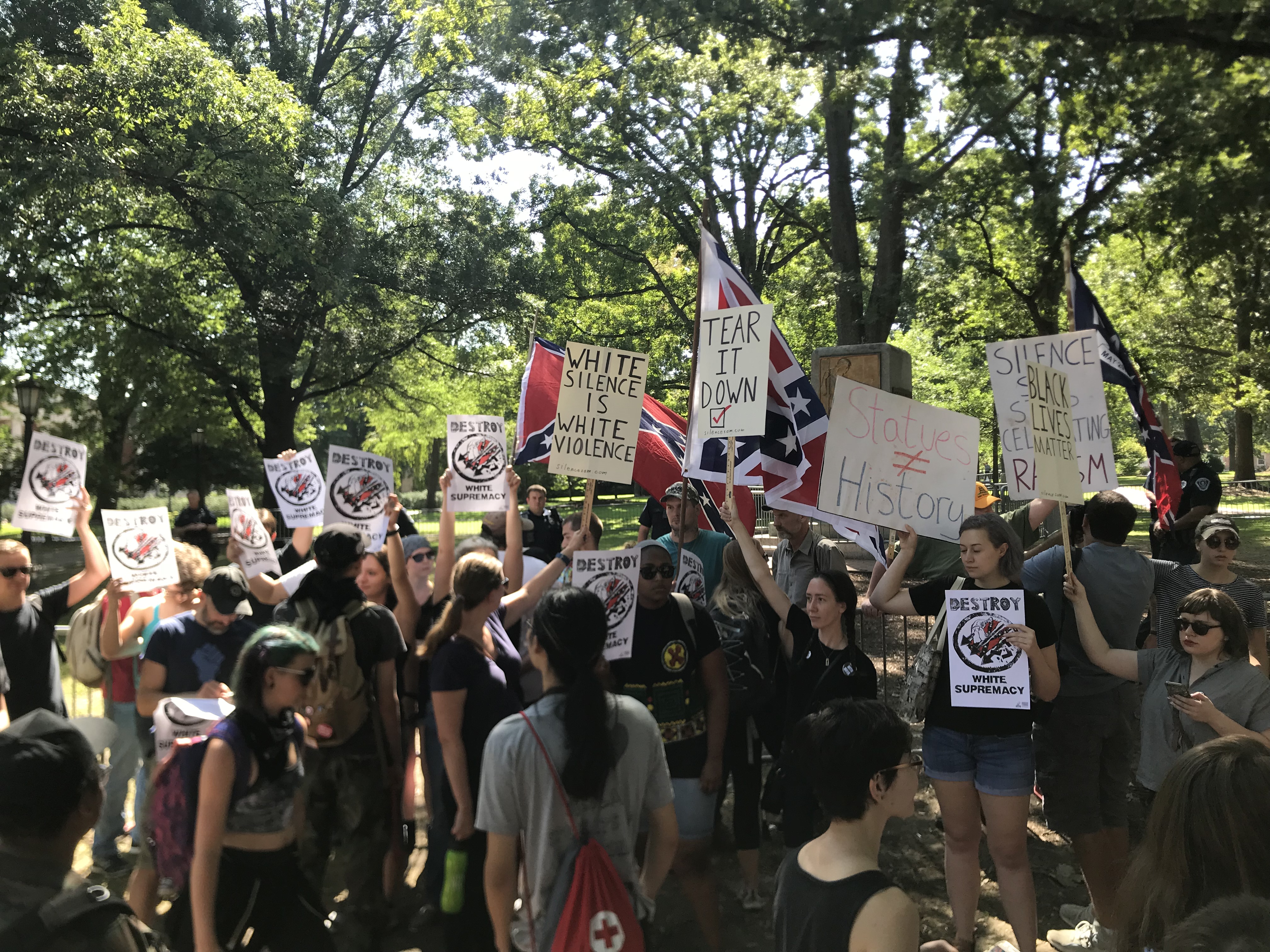
Chapel Hill to UNC: Relocate Silent Sam Away from the TownChapel Hill Mayor Pam Hemminger and members of the Town Council sent a letter to UNC following the voided lawsuit between the university and a pro-Confederate group. Last week, Judge Allen Baddour ruled that the Sons of Confederate Veterans lacked evidence to prove the group had legal standing to bring action against the UNC System and dismissed […]
![]()
Confederate Group Lawsuit, Silent Sam Settlement Dismissed in CourtAn Orange County judge has dismissed the lawsuit filed by the Sons of Confederate Veterans against the UNC System, voiding the $2.5 million payment to the pro-Confederate group and the transfer of property of the Silent Sam monument. After hearing arguments from both original parties, as well as two groups who filed amicus briefs arguing […]
›

